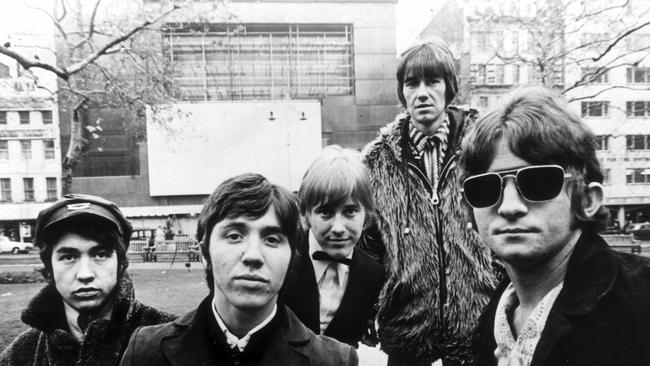Sizzled and burned...The baby-faced superstar who took Australian music to the world
He was just 16 when a meeting with other assisted migrants at Villawood Migrant Hostel recast baby-faced Steven Wright as a teen heart-throb. Sadly, Sydney’s own Brit-pop superstars sizzled and burned after six years, leaving Wright unemployed at 22.

Today in History
Don't miss out on the headlines from Today in History. Followed categories will be added to My News.
He was just 16 when a meeting with other assisted migrants at Villawood Migrant Hostel recast baby-faced Steven Wright as a teen heart-throb.
Sadly, Sydney’s own Brit-pop superstars sizzled and burned after six years, leaving Wright unemployed at 22 and permanently saddled with Stevie, although he hated the dimunitive moniker.
None of which detracts from Wright’s legacy of pumping Easybeats hits that charmed audiences first in Australia, then across England, Europe and the US.
Wright, who died early yesterday, indulged his passion for pop from his mid-teens, fronting local band The Outlaws, and surf-band-turned Beatles-style Chris Langdon & The Langdells.
Wright was approached by his fellow Easybeats while performing at Suzie Wong’s, a Chinese restaurant between King and Pitt streets renowned for regular jazz and R&B performances.
Netherlands-born migrants, guitarist Hendricus Vandenburg (Harry Vanda) and Dingeman Vandersluys (Dick Diamonde), travelled from Villawood to watch Wright perform. All had met Glasgow-born guitarist George Young, then living with his family at Burwood.
Wright, born in Leeds on December 20, 1947, lived near the hostel with his parents. His father, staff-sergeant George Wright, brought the family to Melbourne as assisted migrants in 1958, moving to Sydney by 1960.
The hostel had an energetic amateur music scene when Wright joined Vanda, Diamond and Young to rehearse in its laundry. Another English migrant, Liverpool-born Gordon “Snowy” Fleet, was recruited as drummer and suggested the name Easybeats, a tribute to his fellow Liverpudlians.
Kicked out of a city pub for being too loud and too dirty, the Easybeats donned neat suits to secure a weekly residency at Beatle Village. In December 1964 they met Hornsby real estate agent Mike Vaughan, who introduced his friend, music publisher and record producer Ted Albert, then enjoying success with Billy Thorpe and The Aztecs. Albert signed them to Albert Productions and EMI/Parlophone, and in March 1965 selected Wright and Young’s composition, For My Woman, as a single.
Wright and Young, later a producer for his younger brothers’ band AC/DC, already had 20 original compositions written around the piano at Young’s home. Their next release, She’s So Fine, changed everything.
“I remember coming home from school and seeing all these people outside the house, and I couldn’t get in,” Angus Young recalled of his introduction to rock ’n roll fame in 1965. “There was all these police, all these schoolgirls …That’s how I found out my brother had a hit.”
The Easybeats became a household name around the country, winning a live following with Wright’s acrobatic stage leaps and backflips, backed by successive hits such as Sorry and Wedding Ring.
As “easyfever” swept Australia, in 1966 more than 4000 screaming teenage girls swamped Perth aiport as the Easybeats passed through enroute to London, where they had an international hit with Friday On My Mind, written by Young and Vanda and recorded at Abbey Rd studios.
Although Australian newspapers reported in June 1967 that “five young immigrants known as the Easybeats have made a million dollars in the past year,” Friday began a downhill slide for Wright. More songwriting credits went to Vanda and Young, while Fleet quit to be with his family. After their low-key Australian farewell tour in late 1969, The Easybeats disbanded.
Vanda and Young returned to England as freelance writer-producers . Wright stayed in Australia, briefly performing with the Rachettes and working on a solo career.
After working in fashion sales his electrifying performance as Simon Zealotes in the Australian production of Jesus Christ Superstar in 1972 rebooted his solo career, and introduced him to heroin.
Vanda and Young returned in 1974, taking control of Wright’s solo career with their epic composition Evie, an instant hit for Wright in May 1974.
Then addicted to heroin, Wright booked into Chelmsford Private Hospital, where 26 of psychiatrist Harry Bailey’s patients died under drug-induced deep sleep and electric shock therapy. In two weeks at Chelmsford, 14 shock treatments left Wright so brain damaged he stopped writing songs for 10 years.
When an Easybeats reunion fell through, Wright entered rehab at Odyssey House, emerging on November 4 1979 to perform all 11 minutes of Evie for 100,000 people in a concert on the steps of Sydney Opera House.
The Easybeats successfully reunited in 1986. Wright had retired to the South Coast when Friday On My Mind was voted first in the Top 30 Australian songs in 2001. Wright, who is survived by his son Nicholas, last performed in 2009.
ABC television will replay Blood + Thunder: The Sound Of Alberts, about the label behind The Easybeats, tonight and tomorrow night at 9pm.
Originally published as Sizzled and burned...The baby-faced superstar who took Australian music to the world


